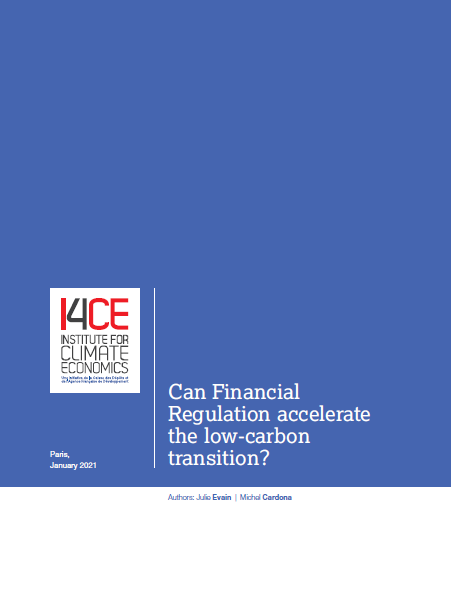Can financial regulation accelerate the low-carbon transition?
In recent years, financial regulators have encouraged financial actors to take account of “climate risks” in order to ensure both financial stability and the efficient functioning of markets, the two traditional objectives of regulation. This risk-based approach is an important first step, but will it be enough to deliver on climate objectives? In this full study, as in the summary for policymakers available here, I4CE explores the specific actions that financial regulators could implement in order to go further and to accelerate the financing of the low-carbon transition.
An increasing number of NGOs and researchers are calling on financial regulators to go beyond their traditional objectives in order to contribute to financing the low-carbon transition. In the European and North American countries, the debate on this issue is highly polarised, with regulators and supervisors tending to be against it, especially where prudential regulation is concerned. But before disagreeing on the principle, it is important to look at whether financial regulation can truly contribute to financing the low-carbon transition and to examine the regulatory changes that would be necessary. I4CE has thus explored the specific actions that regulators could implement in order to accelerate the financing of the low-carbon transition. To do so, the authors took as their starting point the real obstacles to this financing observed “in the field”. To inform this analysis, more than 20 interviews were conducted with business leaders, researchers, financial actors and French and European regulators.
Financial regulation can accelerate the financing of the low-carbon transition
The analysis conducted reveals that financial regulation can complement the range of tools available to the public authorities to accelerate the financing of the transition. It goes without saying that it cannot – and should not seek to – replace fiscal, economic and environmental policies, which have a crucial role to play in guiding economic action. But it can act on three levels to facilitate the financing of the transition: improving financial actors’ understanding of the challenges of the transition, correcting short-term biases in financial actors’ preferences, and encouraging financial actors to get involved in projects with low returns.
Click on this button to see the image
For each of these areas, the authors propose several avenues for regulators to explore. To enhance financial actors’ understanding of climate issues, they thus propose for example making changes to Autorité des Marchés Financiers (Financial Markets Regulator) certification for market actors and including training in supervision expectations. They also propose incorporating climate impact criteria into the variable remuneration of financial actors to ensure they have a longer term perspective; or encouraging them to get involved in projects with low returns by explicitly incorporating climate criteria into the concept of fiduciary responsibility, or by using prudential regulation to integrate climate criteria into the financial decisions of banks.
Should financial regulation also be used to directly support the financing of the transition? Or should regulators stick to their traditional objectives of financial stability and efficient market functioning? This debate needs to involve all stakeholders and should not be restricted to just financial experts. It should focus on not only the objectives to be set for financial regulation, but also on the regulatory instruments available, their climate effectiveness, the potential conflicts of objectives with the other objectives of financial regulation, and the governance changes required, beginning with changes to the mandate of financial supervisors.
In this two-minute video, Julie Evain, I4CE’s Project Manager – Finance, explains the obstacles and tools identified for the financing of the low-carbon transition :


